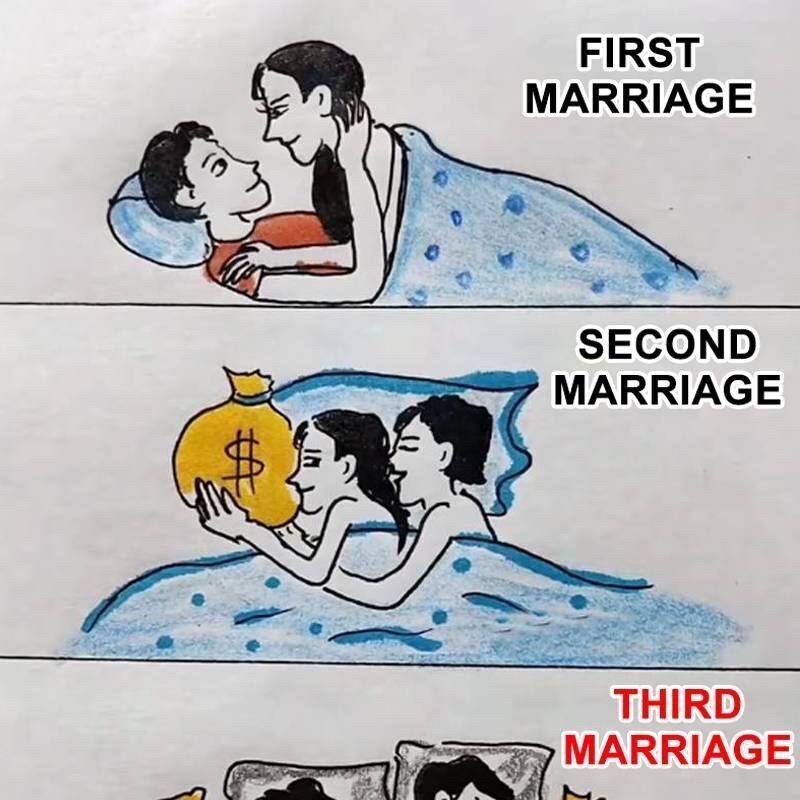Marriage evolves as people move through life. Expectations shift, energy changes, maturity grows — all shaped by experience, heartbreak, healing, and the quiet wisdom that comes from seeing where you got it right and where you didn’t. The difference between a first, second, or third marriage isn’t about the number; it’s about who you become along the way.
First marriages often start with boundless enthusiasm, sometimes bordering on fantasy. People believe love alone will carry them through every challenge. They assume passion will always burn bright, communication will be effortless, and their partner will anticipate their needs without explanation. It’s a marriage of hope — often naive hope. Two people attempting to build a life while still discovering themselves. Conflicts appear, as they inevitably do, and first-time spouses may lack the emotional tools or experience to navigate them. Arguments feel threatening, disagreements become personal, and unrealistic expectations start to crack. Some couples grow through these challenges, learning together; others realize that marriage rarely matches the dream they imagined.
Second marriages tend to be grounded in self-awareness. By this stage, people have experienced heartbreak, communication breakdowns, and the reality that love alone doesn’t fix incompatible values or emotional immaturity. They enter more cautiously, asking better questions, recognizing patterns in themselves and their partners, and knowing their limits. A second marriage often comes with added complexities — children from previous relationships, custody arrangements, ex-partners, blended family dynamics, and financial obligations. Trust may take longer to build, but the relationship can also be stronger, more intentional, and more realistic because both parties see clearly what they want and need.
Third marriages usually carry a different purpose. They aren’t about fairy tales or erasing the past. By now, people understand the consequences of forcing a relationship to fit a fantasy. Third marriages often prioritize companionship, steady emotional connection, respect, and peace. Life’s priorities have shifted; the focus is on creating a daily life that feels good rather than chasing perfection. Boundaries are clearer, ego is lighter, and partners are less likely to try to “fix” each other. These marriages can be surprisingly peaceful — honest, low on drama, and appreciative of stability.
Across all marriages, one truth remains: communication is essential. Real communication — vulnerable, sometimes uncomfortable, always honest. Successful couples learn to talk without attacking, listen without defending, and compromise without resentment. Emotional growth forms the foundation of lasting relationships. People who reflect on their flaws, adjust expectations, and evolve alongside their partner tend to create marriages that endure, whether it’s their first or third.
Love isn’t measured in grand gestures but in daily choices: choosing patience when you want to snap, understanding when you want to judge, and connection when it would be easier to shut down. First marriages often assume these choices will come naturally. Second marriages recognize they require effort. Third marriages value the work itself, knowing it sustains the relationship.
Ultimately, the difference between first, second, and third marriages lies in the person who enters it. Life changes people — loss, parenting, careers, failures, and victories all reshape priorities. What mattered in your twenties may fade in your forties. What once seemed insignificant may become essential. And what once felt like a dealbreaker may barely register with perspective.
Every marriage reflects the emotional strength and clarity of those in it. A first marriage often teaches self-discovery. A second marriage applies hard-earned lessons. A third marriage honors what truly matters. Each stage has challenges, but each offers a chance to grow, choose wisely, and love more deeply.
No matter the stage, a successful marriage comes from honest communication, emotional maturity, mutual respect, and a willingness to evolve together. Love thrives when both partners keep choosing to show up — not as perfect people, but as imperfect humans willing to learn, adapt, and build something real.
